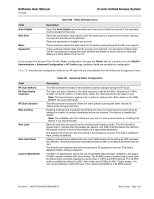D-Link DWS-4026 Product Manual - Page 426
Hide SSID, Ignore Broadcast, L3 Tunnel, L3 Tunnel Status, L3 Tunnel Subnet, L3 Tunnel Mask, Table 263
 |
UPC - 790069325533
View all D-Link DWS-4026 manuals
Add to My Manuals
Save this manual to your list of manuals |
Page 426 highlights
D-Link Unified Access System Software User Manual 12/10/09 Field SSID Hide SSID Ignore Broadcast VLAN L3 Tunnel L3 Tunnel Status L3 Tunnel Subnet L3 Tunnel Mask Table 263: Wireless Network Configuration Description Wireless clients identify a wireless network by the SSID, which is an alphanumeric key that uniquely identifies a wireless local area network. The SSID can be up to thirty-two characters in length, and there are no restrictions on the characters that may be used in an SSID. You can hide the SSID broadcast to discourage stations from automatically discovering your access point. When the broadcast SSID of the AP is hidden, the network name is not displayed in the list of available networks on a client station. Instead, the client must have the exact network name configured in the supplicant before it is able to connect. Disabling the broadcast SSID is sufficient to prevent clients from accidentally connecting to your network, but it will not prevent even the simplest of attempts by a hacker to connect, or monitor unencrypted traffic. Hiding the SSID offers a very minimal level of protection on an otherwise exposed network (such as a guest network) where the priority is making it easy for clients to get a connection and where no sensitive information is available. If a wireless client broadcasts probe requests to all available SSIDs, this option controls whether the AP will respond to the probe request. • Select this option to prohibit the AP from responding to client probe requests • Clear this option to allow the AP to respond to client probe requests. A virtual LAN (VLAN) is a software-based, logical grouping of devices on a network that allow them to act as if they are connected to a single physical network, even though they may not be. The nodes in a VLAN share resources and bandwidth and are isolated on that network. The D-Link Unified Switch supports the configuration of a wireless VLAN. You can configure each VAP to be on a unique VLAN or on the same VLAN as other VAPs. When a wireless client connects to the AP by using this network (SSID), the AP tags the client's traffic with the VLAN ID you configure in this field. By default, all networks use VLAN 1, which is also untagged by default. Note: The VLAN ID you configure in this field can be overridden by the VLAN ID configured for the AP in the RADIUS server. In other words, if your network uses a RADIUS server to assign wireless clients to VLANs, the wireless client uses the VLAN ID from the RADIUS server and ignores the VLAN ID configured on the VAP. The L3 Tunnel feature allows mobile stations to maintain their IP connections while roaming from one access point to another access point even when these access points are attached to different IP subnets. Note: When L3 tunneling is enabled the VLAN ID is not used. In fact, the switch puts the management VLAN ID, if any, on the tunneled packets. Note: If the wireless network topology changes (for example, a Unified Switch reboots) while the L3 tunneling feature is in use, you should perform an ARP refresh on wired clients to speed up the process of re-establishing connectivity to the tunneled network. This field shows the status of L3 Tunneling. In order for tunnel to be completely configured, routing must be enabled and the switch must have a routing interface IP address that is in the tunnel subnet. The the status can be one of the following: • None (L3 Tunnel is disabled or the network is not associated with any AP profiles) • Configured • Not Configured - Routing Disabled • Not Configured - No Routing Interface The network IP address you enter in this field must be in the same subnet as a routing interface for the WLAN that you define on the switch. Enter the subnet mask for the network IP address on the L3 Tunnel subnet. Page 426 Basic Setup Document 34CSFP6XXUWS-SWUM100-D7















